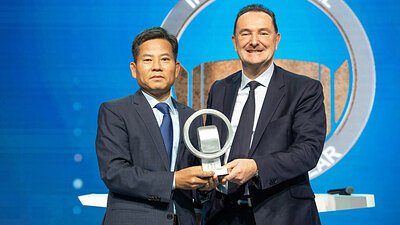
Kia Electrifies Commercial Vehicle Sector with Award-Winning PV5 Van
Kia’s all-electric PV5 has shattered expectations, earning the International Van of the Year award and signaling a major shift in the commercial vehicle landscape. Is this the dawn of a new era for electric fleets?
Kia Electrifies Commercial Vehicle Sector with Award-Winning PV5 Van
NEW YORK, NY – November 20, 2025
A New Challenger Emerges
Kia has dramatically upended the established order in the light commercial vehicle (LCV) market, claiming the prestigious 2026 International Van of the Year (IVOTY) award with its all-electric PV5. This victory isn't merely a symbolic win for the South Korean automaker; it represents a pivotal moment, marking the first time an Asian brand – and specifically a Korean vehicle – has claimed this coveted title. The PV5’s triumph signals a significant shift in the commercial vehicle landscape, challenging the decades-long dominance of European and American manufacturers.
For years, the LCV market has been characterized by incremental innovation, with manufacturers primarily focusing on optimizing existing internal combustion engine platforms. Kia, however, has taken a bold leap forward, embracing full electrification and modular design with the PV5. This strategic decision, underpinned by substantial investment and a long-term vision, appears to be paying dividends.
Beyond the Award: A Platform for Growth
The IVOTY award isn't just about a single vehicle; it's a validation of Kia’s broader “Platform Beyond Vehicle” (PBV) strategy. The company is investing heavily – approximately $2.74 billion – in dedicated PBV production facilities, including a state-of-the-art complex in Hwaseong, South Korea, capable of producing 250,000 units annually. This commitment demonstrates Kia's ambition to become a leading global provider of purpose-built electric commercial vehicles.
“We’re not just building vans; we’re building a platform for the future of commercial mobility,” explained one source close to the company. “The PBV strategy is about providing customizable solutions that meet the unique needs of businesses, from last-mile delivery to mobile workshops.” The PV5 is the first iteration of this vision, but it won’t be the last. Kia plans to expand the PBV lineup with a range of variants – including chassis cabs, cargo standard models, and high-roof options – to address diverse market segments.
The modularity of the PBV platform is particularly noteworthy. The ability to easily swap upper bodies and customize configurations allows businesses to tailor vehicles to their specific requirements, reducing downtime and maximizing efficiency. This approach contrasts sharply with the traditional model of offering limited customization options.
Disruption and Competition in the eLCV Market
The electric light commercial vehicle (eLCV) market is experiencing rapid growth, driven by increasingly stringent emission regulations, growing demand for sustainable last-mile delivery solutions, and the falling cost of battery technology. While established players like Ford, Mercedes-Benz, and Stellantis are investing in electric vans, Kia’s PV5 is quickly gaining traction.
“Kia has entered the market at the right time with the right product,” commented a transportation industry analyst. “The PV5 offers a compelling combination of range, payload capacity, and affordability, making it an attractive option for businesses looking to electrify their fleets.” The vehicle’s official WLTP range exceeds 250 miles, and recent tests have demonstrated its ability to travel nearly 431 miles on a single charge while carrying a full payload.
Competition in the eLCV market is fierce, with several new players vying for market share. Rivian, with its purpose-built electric delivery vans, is another emerging contender. Chinese manufacturers, like BYD, are also gaining ground, offering competitive pricing and innovative features. This influx of new players is forcing established manufacturers to accelerate their electrification plans and invest in new technologies.
The Road Ahead: Beyond Transportation
Kia’s vision for the PBV platform extends beyond simply providing transportation solutions. The company is actively exploring the integration of advanced technologies, such as robotics and autonomous driving, to create a fully integrated commercial mobility ecosystem. The company anticipates that future PBV models will be able to perform a wide range of tasks, from automated package delivery to mobile service repairs.
“We’re not just building vehicles; we’re building a platform for the future of work,” said one insider. “We see PBVs as a key enabler of the next generation of mobile services.” The potential applications of the PBV platform are virtually limitless, ranging from pop-up retail stores to mobile healthcare clinics.
The success of the PV5 and the PBV platform will depend on Kia’s ability to continue innovating and adapting to the evolving needs of the market. The company must also invest in charging infrastructure and develop robust fleet management solutions to support the widespread adoption of electric commercial vehicles. The challenges are significant, but the opportunities are even greater. Kia’s award-winning PV5 is a clear indication that the company is well-positioned to lead the charge towards a more sustainable and efficient future for commercial mobility.
